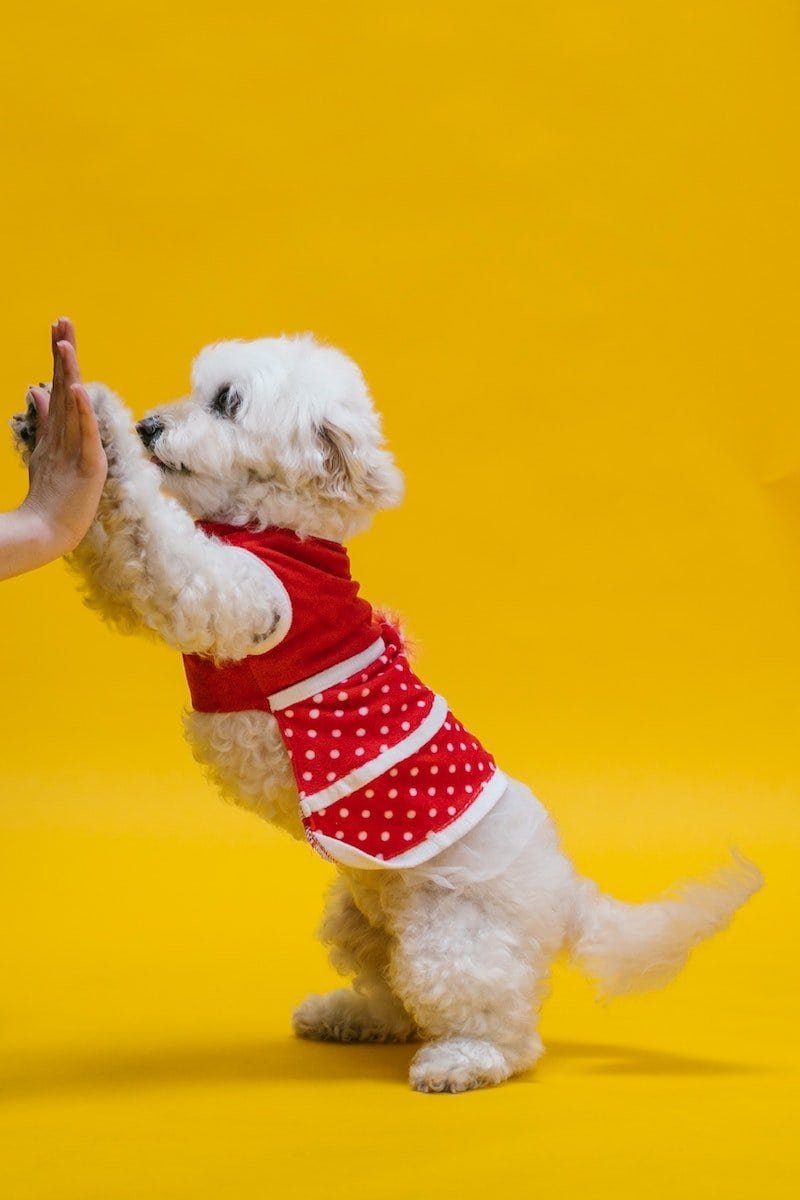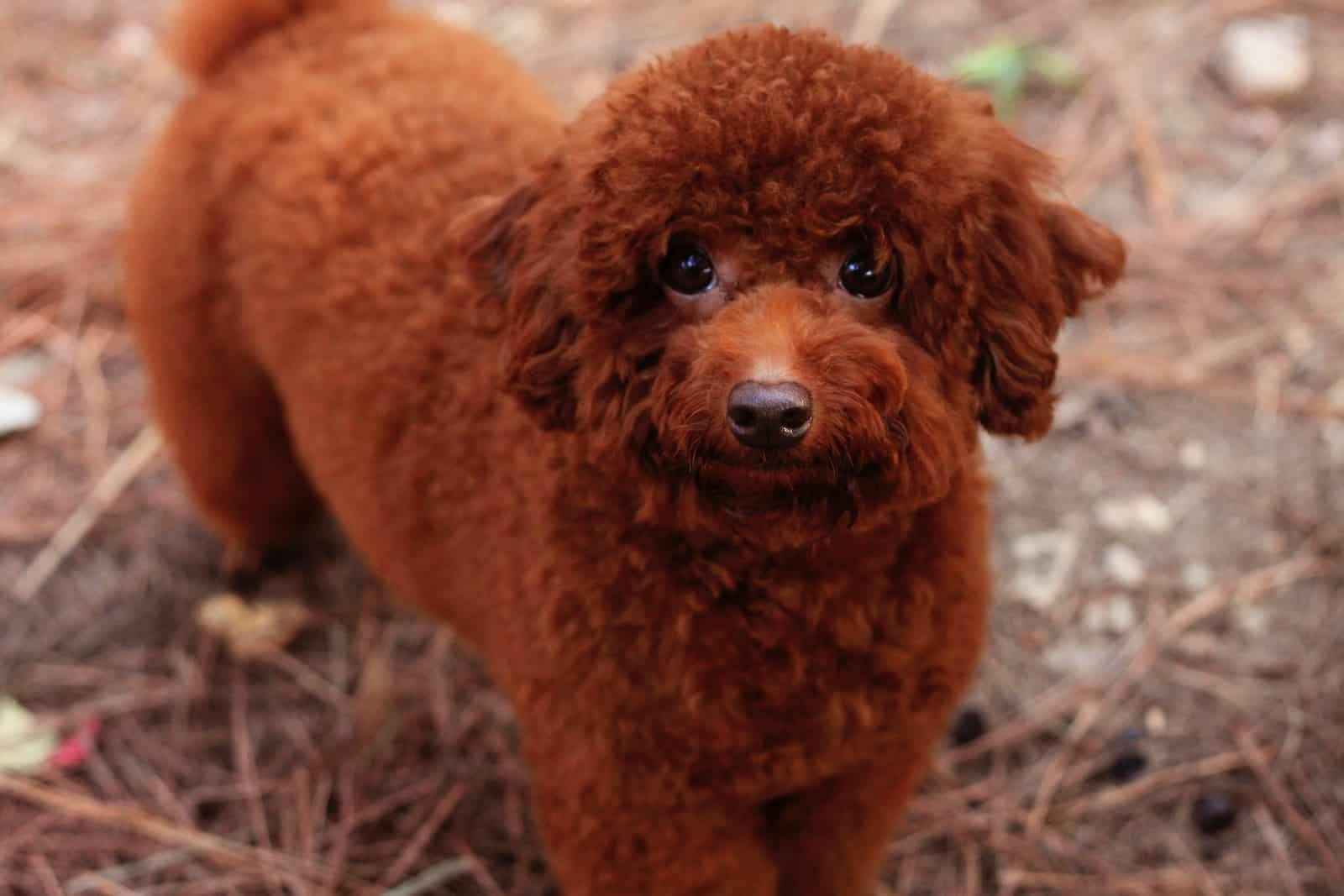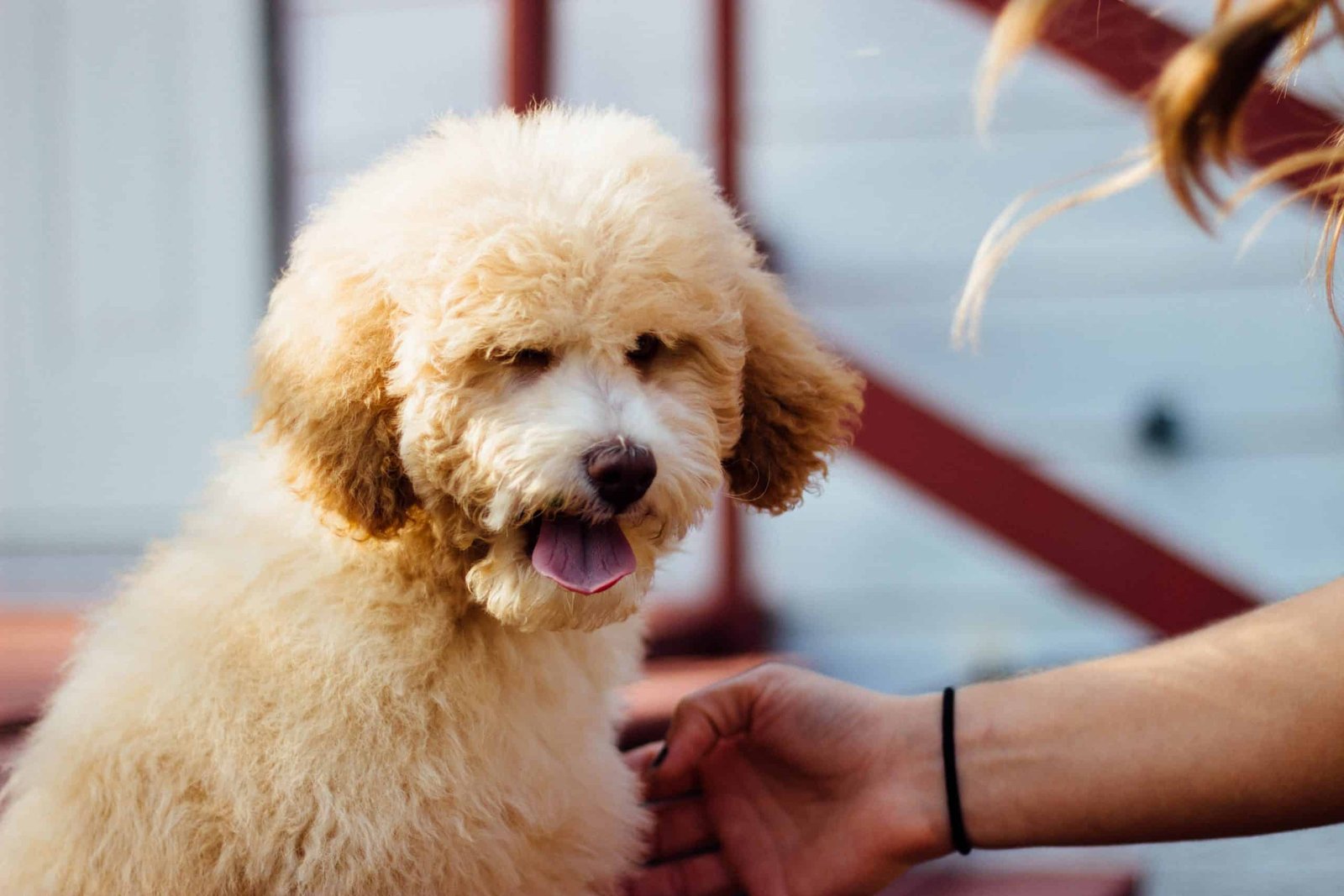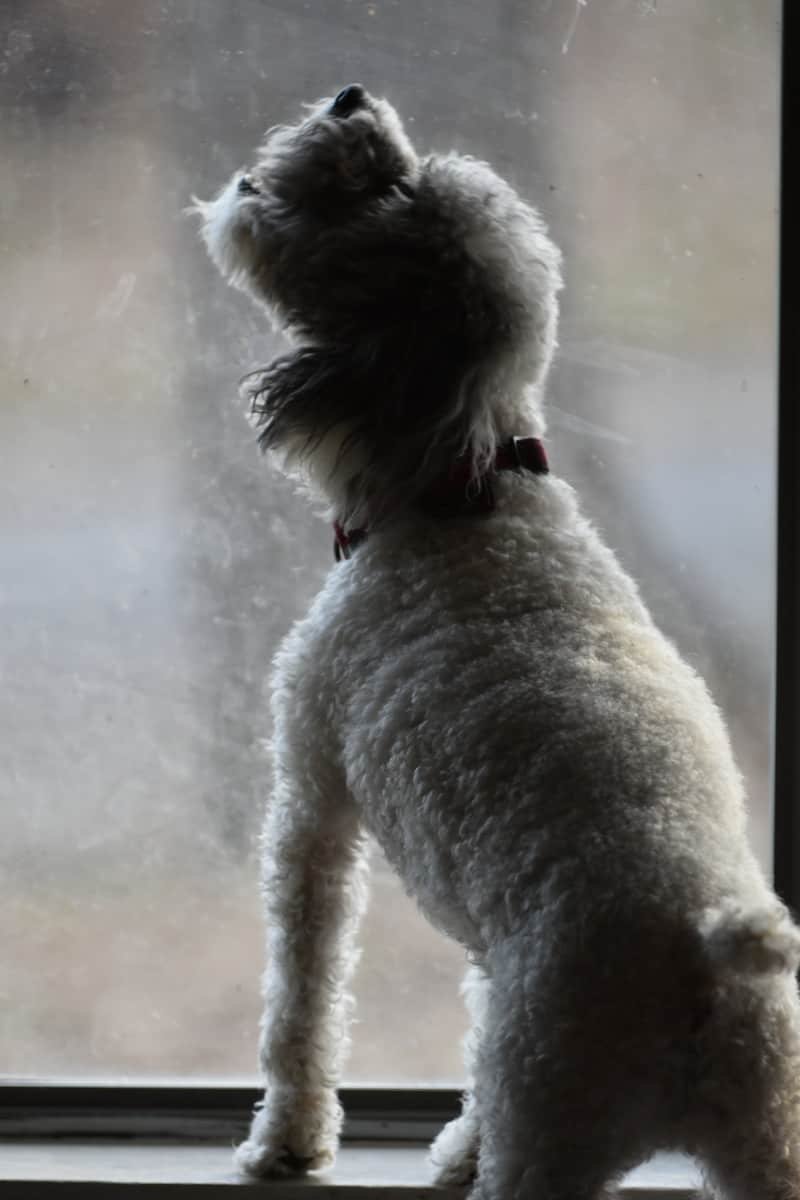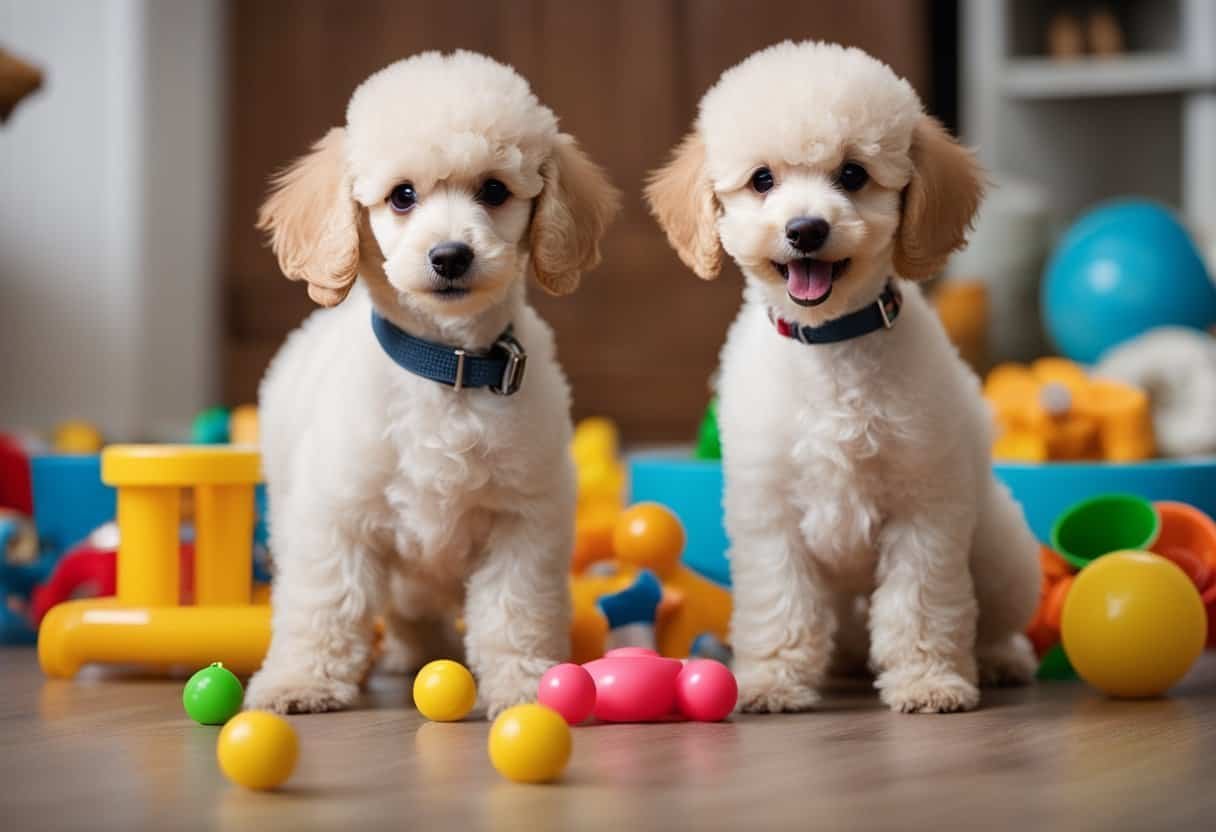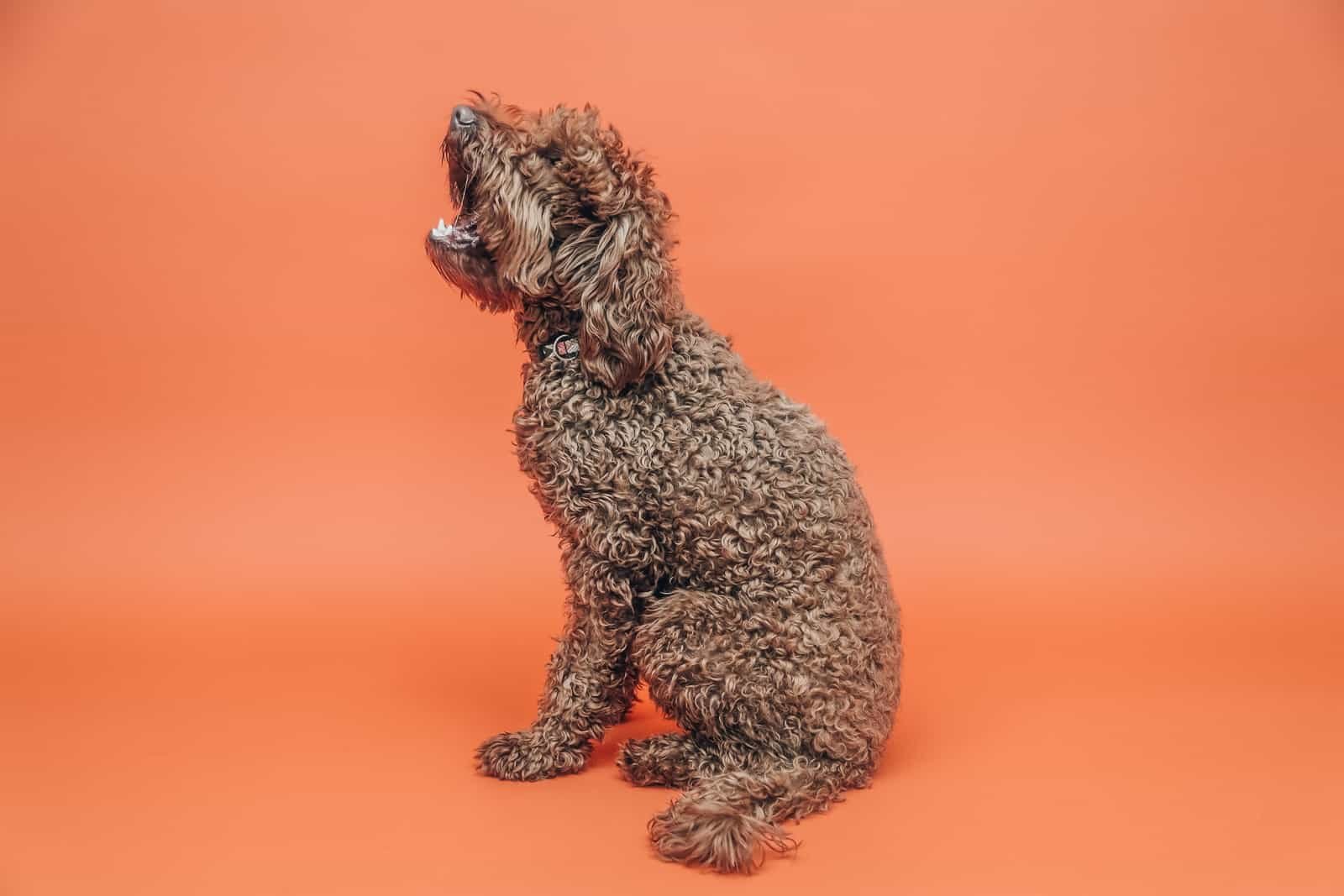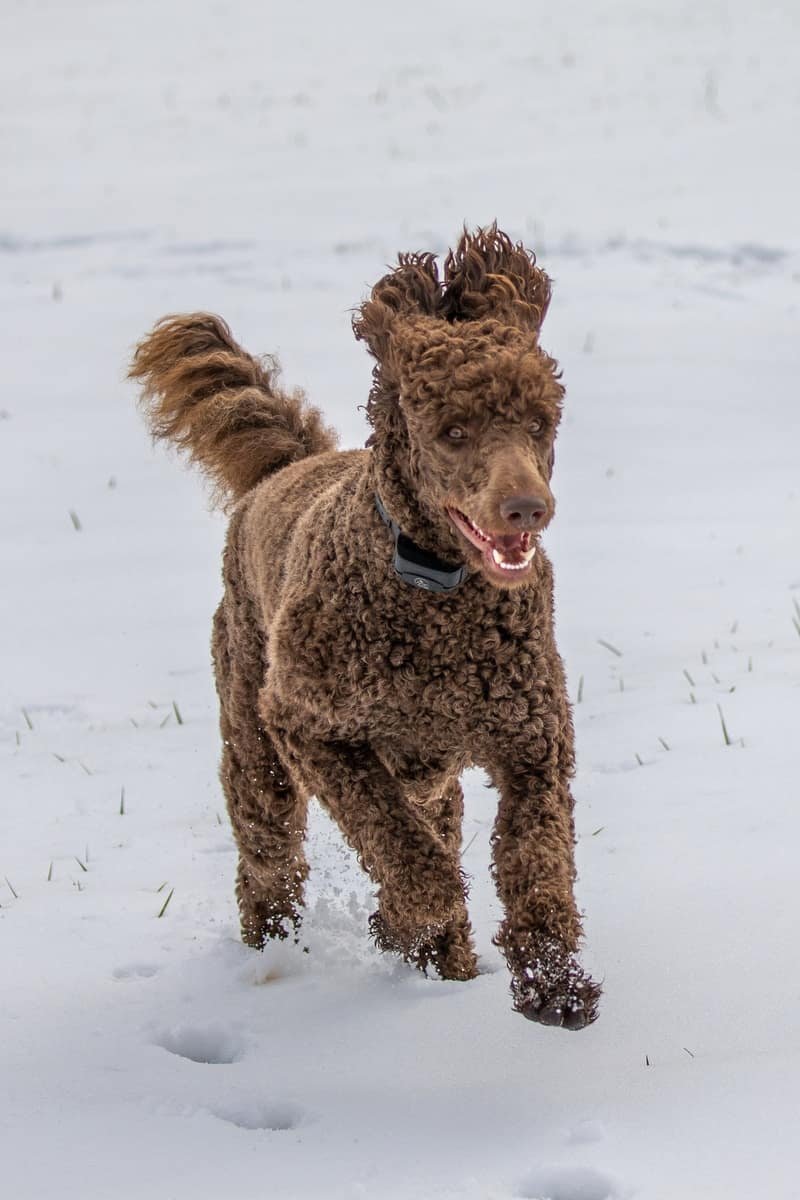
Are you struggling with an aggressive poodle? Aggression in dogs of all breeds can be a difficult to manage and potentially dangerous for other animals and/or people. Poodles are no exception, as they can become aggressive due to many factors. From genetic predisposition to lack of training, there are many reasons this breed may display aggressive behavior. This guide will provide an in-depth look at the warning signs, causes, and types of aggression in poodles and tips for how to prevent and manage it. With the right understanding and knowledge, you can take proactive steps towards restoring harmony between you and your beloved pup.
Poodles are known for their friendly nature and gentle temperament. They are also known for being extremely loyal and protective of their owners. This trait can lead to moments when poodles can become aggressive towards other dogs.
Poodle aggression can become an issue; caused by factors including genetics, personality, frequency of training sessions or obedience training, proper socialization, and environment. Unacceptable behavior can include barking, biting, lunging, growling, snapping, and other forms of aggression.
Related Reading: Dog Training Rescue: A Complete Guide
Related Reading: Poodle Intelligence Training – Unlock Your Dog’s Potential
Related Reading: Dogs For Training: A Complete Guide
Related Reading: Dogs Barking: A Complete Guide
Related Reading: Training Rescue Poodles – Rehabilitation Behavior Guide
Problem: My dog is aggressive towards other dogs. I don’t like my dog to be aggressive towards other dogs; yet he’s consistently friendly and gentle with everyone else.
Solution: There are many ways to help your dog learn how to behave appropriately around other dogs. One way is through positive reinforcement. When he does something good, give him positive reinforcement and/or a treat. When he does something bad, ignore him. Another way is through negative reinforcement. When he does what you don’t want him to do, use a leash or a choke chain to stop him.
Poodles are not naturally aggressive animals, they can be bred that way or trained that way, but in nature, they are not aggressive.
In addition, the breed standard for a Poodle states: “The head is carried high and proud with ears erect.” This means that if you have an overly excited dog who has been given too much attention from his owner, he will likely become more excited than usual when around strangers.
About This Guide
- Real Experience: Written by poodle enthusiasts with years of hands-on experience caring for and training poodles.
- Expert Reviewed: Content verified by certified dog trainers and veterinary professionals.
- Fact-Checked: Information sourced from the AKC, veterinary journals, and breed specialists.
- Last Updated: November 2025
What Does Aggression in Poodles Look Like?
Poodles can exhibit aggression that should not be taken lightly. It can manifest as anything from growling and barking to snapping or even biting. People must address and manage all types of aggression, whether it is directed at humans or other animals, properly in order to ensure the safety of everyone involved.
It’s important to remember that aggression is often caused by fear, so it’s important to remain calm when dealing with an aggressive poodle. The best way to deal with this type of behavior is by providing positive reinforcement for good behaviors and avoiding punishing the pup for inappropriate behavior. Proper training, socialization, and obedience will also help reduce the chance of an aggressive episode occurring. Making sure your poodle has plenty of outlets for exercise, mental stimulation, and social interaction will help prevent unwanted behaviors from developing.
At the end of the day, it is important to remember that aggression in poodles is a serious issue that should not be taken lightly. With proper training, socialization, and reinforcement of good behaviors, you can help ensure that your beloved pup remains safe and happy. But be on the lookout for warning signs of aggression – we’ll discuss those soon!
Warning Signs of Aggressive Behavior in Poodles
It’s important to be aware of the warning signs that your poodle may be displaying aggressive behavior so you can take preventative measures before it escalates. One sign of aggression in poodles is growling and barking, especially when they feel threatened or uncomfortable. If your pup starts to display this behavior while in social situations, it’s important to remove them from the situation immediately. Another sign is snapping or lunging at people or other animals, which can indicate a fear-based aggression issue.
Other warning signs include pushing their food bowl away or not eating, which could indicate stress or anxiety; refusal to obey commands; frequent submissive urination; and excessive licking of their paws or body. It’s also important to look out for signs that your pup might be feeling overwhelmed such as panting heavily, avoiding eye contact, drooling excessively, and trembling.
If you notice any of these warning signs in your poodle it’s important to seek help from a professional trainer. Aggression issues can usually be managed with proper training and reinforcement of positive behaviors but if not handled correctly it can become more serious over time. As pet parents, it’s crucial we pay attention to our furry friends and ensure they are getting the care they need!
By taking the time to understand the causes of aggression in your poodle and providing them with the appropriate training, you can help to keep them safe and happy. And be sure to stay tuned for our next section on genetic factors – it might just surprise you!
Causes of Aggression in Poodles
Aggressive behavior in poodles can be caused by a variety of factors. One of the most common causes is fear-based aggression, which can be triggered by unfamiliar people or animals, loud noises, or sudden changes to their environment. Separation anxiety is another common cause, as poodles are bred to be social and they may become stressed when they’re left alone for long periods of time. In some cases aggression in poodles may also be due to frustration, such as when they don’t get enough physical and mental stimulation or have difficulty understanding commands.
In order to address aggressive behaviors in your poodle it’s important to first identify what is causing the aggression and then work on resolving the underlying issue. Obedience training is key for any pup but especially those with aggressive tendencies. Positive reinforcement techniques are highly effective for teaching good manners and curbing unwanted behavior. Socialization training can also help your pup learn how to interact with other animals and people without feeling threatened or fearful. Finally, if needed you should consider consulting with a professional trainer who specializes in behavioral issues for further help managing your pup’s aggression.
By taking the time to understand the causes of aggression in your poodle and providing them with the appropriate training, you can help to keep them safe and happy. And be sure to stay tuned for our next section on genetic factors – it might just surprise you!
Genetic Factors
Genetic Factors and Aggression in Poodles
Believe it or not, genetics can play a role in aggression in poodles. While all dogs are capable of displaying aggressive behavior, certain breeds may be predisposed to it more than others. Standard poodles, mini poodles and toy poodles are considered to be intelligent and sensitive breeds, which can mean they’re more prone to getting scared or feeling threatened by unfamiliar people or animals. And if these feelings aren’t addressed with proper training, they could result in aggressive episodes.
So what does this mean for pet parents? Well, if you’re considering bringing a poodle into your life then it’s important to recognize that these pooches may need extra care and attention when it comes to things like obedience training, socialization activities and providing signs of stress with appropriate outlets. It’s also wise to watch out for warning signs such as growling around food bowls or other items that he might guard as well as any sudden changes in behavior.
By taking the time to understand the genetic factors at play when it comes to aggression in your pup and providing them with the appropriate training from an early age, you can help ensure that your four-legged friend is happy, healthy and safe!
Behavioral Training
Poodles can, however, develop severe anxiety disorders that can lead them to behave aggressively which can affect their temperament. They usually do this when they see that someone is an enemy and is out to cause harm to them or their owner.
Like other types of dogs, poodle breeds can also suffer from separation anxiety when away from their owners for long periods of time, which can cause them to be aggressive.
The first thing I do is to take them out of the house. If they’re not going to run around outside, they should at least be able to play in the yard.
A study of dogs’ behavior found that while most breeds were generally friendly to humans, German Shepherds had higher rates of aggression towards unfamiliar adults than any other breed studied.
Lack of Training and Socialization
Lack of Training and Socialization
When it comes to aggression in poodles, lack of training and socialization can be a major contributing factor. Dogs that don’t have the opportunity to learn how to interact with other animals or people properly can become anxious in unfamiliar situations or around strangers. This can often lead to fear-based aggression, which is when a pup displays aggressive behavior out of fear.
Fortunately, this type of aggression is preventable if pet parents take the time to provide their pup with proper training and socialization from an early age. This could include introducing them to new people, animals and environments as well as teaching them appropriate behaviors and commands like sit, stay and come. Additionally, positive reinforcement techniques such as treats or verbal praise are great for helping your pooch learn better behavior while also providing calming reassurance that they’re safe.
By investing in your pup’s training and socialization needs now, you’ll be giving him the skills he needs to feel confident in all sorts of situations later on down the line – so make sure you don’t forget about these important steps!
Fear-Based Aggression
Poodles are not known to be aggressive in any natural setting. However, just like any animal, if they are put in a bad situation or in a bad mood, they can display fear-based aggression and/or fear biting. But if you train them properly and treat them right, you will never see that side of them and would not be a danger to owners.
Displays of aggression get triggered because of stress, lack of exercise, boredom, frustration, overstimulation, etc. These triggers could come from people touching them inappropriately to loud noises, sudden movements, changes in light levels, smells, sights, sounds, etc.
The most common form of poodle aggression is the bite. This is usually caused by fear-induced aggression or frustration, and it may be directed at people, animals, objects, or even furniture. It’s important to realize dogs don’t understand what they’re doing when they bite. They just do it because they feel threatened.
If you notice that your puppy displays signs of aggression, it is important to understand “the why” in order to understand how best to handle these situations.
As previously mentioned, all types of poodles can be shy at times. That is why it’s important to make sure that they are properly socialized into the world. It might help you find a dog park or other dog meeting groups where they can socialize with other canines.
Poodle protective aggression
Poodles can be known for their protective aggression towards other dogs, depending on how they were trained. This behavior is called poodle defensive aggression. The dog may growl, snap at the intruder, bite, or even chase them away. If the owner is present, they may also try to attack the intruder.
In addition, some poodles have been known to show territorial aggression toward strangers who enter their territory without permission.
This type of aggression has nothing to do with being afraid of another person but rather protecting its home turf. When a stranger enters the area, the poodle feels threatened and tries to defend itself by attacking the invader.
It’s very rare for a poodle to actually hurt anyone unless provoked. Most often, they simply bark or snarl at intruders.
Is Your Poodle Being Aggressive or Protective?
It’s important to know the difference between aggression and protectiveness when it comes to your beloved poodle. While there are certain signs that can signal aggressive behavior in any dog, like deep, guttural barking or snarling, poodles will often express their protectiveness through barks and less intense means. If your pup is simply standing between you and something that might seem threatening, they may just be doing what they think is best to keep you safe!
However, if they become overly aggressive towards family members, strangers or other animals without any warning signs of stress beforehand, then this could indicate an underlying behavioral issue. To prevent this type of aggression in poodles, it’s essential to properly train and socialize them from a young age. Introducing them to new people, animals and environments is key for a well-socialized pooch. Additionally, providing positive reinforcement through treats or verbal praise helps ensure your furry pal learns good behaviors while feeling calm and secure. Lastly, always watch out for any signs of stress as these can be indicators of aggression. If you ever need help with behavioral issues with your pup, don’t hesitate to consult a professional dog trainer!
Territorial Aggression
Territorial aggression is a common behavior among poodles, especially those who haven’t been properly socialized. This type of aggression usually occurs when a pup feels the need to protect their home or family from potential threats. Your poodle may bark and growl when strangers approach the house, particularly if they try to come too close or enter without permission. They may also become aggressive if someone attempts to take away something that belongs to them, such as their food bowls or toys.
It’s important to address territorial aggression in your poodle as soon as you can, as it can lead to more serious issues down the line. Proper training and socialization are essential for helping your pup feel secure in their environment and learning the difference between acceptable and unacceptable behaviors. Additionally, pet parents should always be aware of any signs of stress in their pup, such as panting or cowering, as these can indicate an impending aggressive episode. With patience and consistency on your part, you can help ensure that your furry friend remains a happy, mellow companion!
Types of Aggressive Behaviors in Poodles
Poodles are known for being intelligent and highly trainable dogs, however they can sometimes display aggressive behaviors. While aggression isn’t common in poodles, it’s important to be aware of the different types of aggression as well as the warning signs that could indicate a problem.
Toy and miniature poodles may become overly protective of their owners or show signs of possessiveness when it comes to their toys or food bowls. Standard poodles may also exhibit territorial aggression if they perceive a threat to their home or family. If your pup is displaying any of these types of aggressive behavior, it’s important to address the issue quickly before it escalates.
Separation anxiety can also lead to aggressive behavior in poodles, so if you notice your pup becoming destructive or barking excessively when left alone, this could be a sign that something isn’t quite right. To prevent unwanted behaviors from forming and escalating into more serious issues, obedience training and socialization are key for establishing boundaries and teaching desirable behaviors in your pooch. When necessary, positive reinforcement techniques such as treats or verbal praise can also help with any behavioral issues your pup might be experiencing. With proper training and care, you can help ensure that your beloved poodle remains calm and friendly!
Overall, poodles are intelligent and loving companions that can make wonderful additions to any family. With the right training, socialization and guidance, you can ensure that your pup is a happy and well-behaved member of the household! But if you’re worried about more serious aggressive behaviors such as growling, snapping or biting, stay tuned for our next article on how to handle those issues.
Growling, Snapping and Biting
Growling, snapping and biting are behaviors that no pet parent wants to see in their beloved poodle. While these behaviors can be signs of aggression and can be dangerous, they can also be triggered by fear or stress. If your pup is displaying any of these behaviors, it’s important to take the necessary steps to address the problem as soon as possible.
The first step is to identify what may be causing your pup’s aggression and work on addressing those issues. For example, if your pup is displaying aggressive behavior due to separation anxiety, you’ll want to focus on providing comfort during periods of loneliness and teaching them coping skills for when you’re away from home. If environmental factors such as loud noises or certain people are causing the aggression, then you’ll need to find ways to help your pup feel more secure in those situations.
It’s also crucial to start training your pup right away with positive reinforcement techniques such as treats and verbal praise. This will help reinforce desirable behaviors while also teaching them how to recognize signs of stress and channel it into something more positive. With patience, consistency and a bit of understanding, you’ll be able to help your pup overcome their fear-based aggression so they can become a happy and well-behaved member of the family!
Possessive or Protective Behaviors
Poodles are known for being intelligent, loyal and protective of their people. But if your pup is displaying possessive or protective behavior, it’s important to address the issue as soon as possible. Possessive or protective behaviors can be signs that your pup is feeling stressed or threatened and may even lead to aggression in certain situations.
The key to curbing these behaviors is to identify what’s causing them and work on addressing those issues. If it’s related to another pet in the house, you’ll want to create more positive experiences between the two pups so they feel comfortable with each other. If it’s due to fear of strangers, then socialization training can help your pup feel more secure around new people. Additionally, obedience training can help teach them how to respond calmly when faced with stressful or unfamiliar situations.
Finally, ensure that your pup has their own space where they feel safe and secure such as a bed or crate that’s just theirs. This will help them have an area of their own where they won’t be disturbed by other animals or people and can relax without feeling threatened. With a bit of patience and understanding, you’ll be able to help your poodle overcome any possessive or protective tendencies so they can become a happy and well-behaved member of the family!
Excessive Barking or Lunging
Excessive barking or lunging can be a sign of aggression in poodles, but it’s important to understand that these behaviors can also be a result of fear or anxiety. It’s essential for pet parents to recognize the warning signs early on and take steps to prevent them from escalating.
The best way to address these behaviors is through proper training and socialization. This will help your pup become more comfortable around new people and animals, as well as teach them how to respond appropriately when faced with stressful or unfamiliar situations. Additionally, positive reinforcement is key – reward your pup with treats or praise whenever they show good behavior, so they know that their actions have good outcomes.
Another important step is to identify any potential triggers that could be causing your pup’s anxious reactions. If they bark excessively at certain times of the day, try to figure out what may be causing this reaction so you can avoid it in the future. For example, if the barking occurs when someone comes into the house, try introducing them slowly rather than having them enter suddenly.
Overall, understanding why your pup is exhibiting excessive barking or lunging is essential for helping them overcome these issues and becoming a happy and well-behaved member of the family!
How to Prevent and Manage Aggressive Behavior in Poodles
Aggressive behavior in poodles can be a difficult problem to manage, but with the right training and management techniques it can be avoided. As intelligent dog breeds, poodles are highly sensitive to their environment and require proper socialization to ensure they remain well-behaved. Additionally, obedience training is essential to teach your pup how to respond appropriately when faced with certain situations or triggers.
In addition to training, there are other steps you can take to prevent aggressive behavior in your poodle. For example, making sure they receive adequate exercise and attention each day is key for keeping their energy levels balanced and avoiding any unwanted behavior due to boredom or pent-up energy. Additionally, providing them with comfortable places to sleep and ensuring their food bowls are always full will help keep them content and less likely to act out aggressively.
Finally, it’s important for pet parents to recognize the signs of stress in their pup so that they can intervene before an aggressive episode occurs. Signs of stress may include pacing, panting heavily, trembling or hiding away from people or animals. If you recognize these signs in your pup, take immediate action by removing them from the situation or offering them a calming treat such as peanut butter on a spoon. By following these steps you’ll be able to effectively prevent and manage any aggressive behaviors in your poodle!
With the right training and management strategies, pet parents can ensure their poodle remains a happy, well-behaved pup. With proper socialization and obedience training being essential to preventing aggressive behavior, let’s look at some specific techniques for managing your pup’s behavior in the next section!
Proper Training and Socialization Techniques
Proper training and socialization techniques are key to managing aggressive behavior in poodles. It’s important to start training your pup from an early age and continue reinforcing positive behaviors throughout their life. This includes teaching them basic commands like ‘sit’, ‘stay’ and ‘down’, as well as using positive reinforcement such as treats
Establishing House Rules and Boundaries
or verbal praise when they do something correctly. Additionally, it is essential to introduce your pup to different people, animals and environments in order to prevent any fear-based aggression later on. This can be done through puppy classes and gentle socialization with other dogs or pet owners at the park. Finally, if you notice any signs of stress or aggression in your pup, remove them from the situation immediately and provide them with a calming treat or activity to help reduce any tension they may be feeling. With these tips in mind, you can ensure that your poodle remains a happy and well-behaved companion!
Establishing house rules and boundaries are an important part of owning a poodle. Poodles can be intelligent and loving companions, but they also have the tendency to become destructive or aggressive if not trained properly. Setting clear expectations from the beginning can help your pup understand what behaviors are acceptable and which ones won’t be tolerated.
Begin by establishing basic rules such as where your pup is allowed to go, when it’s time for meals, and any other things that may need to be restricted. It’s important to always remain consistent with these rules so that your pup understands that certain behaviors won’t be tolerated. Additionally, use positive reinforcement techniques like verbal praise or treats when your pup follows a rule in order to encourage good behavior.
Finally, make sure you establish boundaries between you and your pup. Keep in mind that while they may be cute and cuddly, poodles still need their space from time to time—so don’t forget to give them some distance when needed! With these tips in mind, you can ensure that your pup will grow up happy and well-behaved!
People Also Ask
Related questions asked on Google:
- Can poodle be aggressive?
Poodles are very friendly dogs, but they can also be very aggressive when they feel threatened. If you want to know how to train your dog to be less aggressive, here are some tips:
- 1. Make sure to exercise your poodle dog frequently, which helps keep your dog’s mind sharp and aggression low.
- 2. Do not let your dog play too much with other animals. This can cause them to become territorial.
- What causes my poodle to bite me?
Aggressive behavior in a dog usually stems from some fear. A fearful or anxious dog will often react aggressively when it feels threatened, and this can be caused by many things, including:
- – being startled
- – having been bitten before
- – not knowing what’s going on around them
- – feeling trapped
- – hearing loud noises nearby
- – seeing something that scares them
- – smelling something unpleasant
- – getting too hot
- How to best handle an aggressive poodle?
- Remember that the dog’s aggression has nothing to do with your own behavior and most likely derives from their environment. If he feels threatened or frightened by something in his surroundings, it will be very difficult to control himself. He may feel compelled to attack whatever it is that scares him. This can happen when a person approaches too closely or is just looking at him.
- Why is my poodle suddenly aggressive?
- Possibly, your dog was previously bitten by another animal or had a fight with someone else’s dog and was injured in the process. This can cause her to become very protective of her territory and make her more likely to attack other dogs if they enter it without permission.
- Why does my poodle growl at me?
- Poodles are very intelligent dogs, and they can be quite aggressive. They have a lot of energy, so if you don’t give them enough exercise or stimulation, this will build up inside the dog. This is why your poodle may start to growl when it sees you coming home from work. It wants attention but doesn’t get any because you’re too busy with other things.
- Are poodles known to be aggressive?
- Poodles are known for being friendly, loyal, and affectionate dogs. However, they are also known to be very protective of their owners. They are also known to be extremely territorial and aggressive towards other dogs.
- Do poodles get attached to one person?
- Poodles are very loyal and affectionate dogs. They can be quite possessive of their owners, but they will not usually attack other people or animals unless provoked. If you have an aggressive dog towards others, it may need training for the owner to control its behavior.
Providing Mental Stimulation and Exercise
Providing mental stimulation and exercise are important for all breeds of dog, but especially for poodles. As intelligent dogs, they need activities that help them stay physically fit while also providing them with mental challenges. To begin, set aside some time each day to engage in activities like puzzle games and obedience training. Not only will this help keep your pup mentally engaged, but it can also help strengthen the bond between you two!
In addition to activities indoors, make sure to get outside and explore with your pup as much as possible. Going on walks or hikes can be a great way to give them the physical exercise they need while also letting them explore their environment. Additionally, playing fetch or hide-and-seek are great ways to give your pup’s mind a workout!
Overall, providing mental stimulation and exercise is key for any poodle owner looking for a happy and well-behaved pup! With just a bit of effort each day, you’ll have a contented companion who loves spending time with you—no doubt about it!
Identifying Potential Triggers for Aggression in Poodles
No matter what breed of dog you have, it’s important to learn how to recognize potential triggers for aggressive behavior. Poodles tend to be an intelligent breed and can pick up on subtle cues that may cause them to become aggressive or anxious. That’s why it’s important for pet parents to be aware of the warning signs that their pup might display.
First, take note of anything that seems to make your poodle uncomfortable or upset. This could range from loud noises and unfamiliar people, to other pets or certain objects like food bowls. If you notice any changes in your poodle’s behavior when exposed to these triggers—such as barking, growling, lunging, or even biting—it may be a sign of stress or aggression.
It’s also important for pet parents to socialize their pup early on so they can better handle situations like this in the future. Take your pup out as much as possible and expose them to different social situations so they can develop positive associations with new people and places. Finally, use positive reinforcement whenever possible and avoid punishing your pup if they do display aggressive behavior–this will only make matters worse!
By understanding potential triggers for aggression in poodles and providing proper training and socialization opportunities early on, pet parents can help ensure their pup grows into a well-behaved companion!
By providing the correct environment and training for your poodle, you can ensure that they grow into a loving and well-behaved companion! And if you’re looking for an even bigger challenge, why not try having a baby?
Babies
Having a baby is an exciting and life-changing experience. But when you have a poodle at home, it’s important to take the necessary steps to ensure your pup is comfortable with your new addition.
Toddlers
Start by introducing your poodle slowly and gradually to the baby. Let them sniff around the stroller and get familiar with the sound of their cooing or babbling. It also helps if you give them treats or praise for calm behavior during these encounters.
Socialization training can also help teach your pup how to interact calmly with babies, so consider enrolling them in obedience classes or play dates with other dogs who are used to being around babies.
Finally, make sure that any interactions between your poodle and baby are supervised at all times; this will help keep everyone safe and ensure that any aggressive episodes can be quickly stopped in their tracks. By taking these steps, you’ll be able to successfully introduce your poodle to your newborn without any problems!
When toddlers and poodles are a part of the same household, it can be a challenge keeping both happy. As curious and energetic as they are, toddlers tend to be rough with animals, while standard poodles may become anxious when handled too roughly. It’s important to teach your toddler proper behavior around animals and explain that poodles need gentle treatment. Show them how to pet the dog in a calm manner, how to play fetch safely, and how to interact in social situations without overwhelming the pup.
Regular obedience training for your pup is also essential for teaching them how to behave around your toddler. Make sure you provide plenty of positive reinforcement for good behavior and discourage any aggressive tendencies with distraction or verbal warnings. If your poodle shows signs of stress or aggression towards your toddler, consider enrolling them in behavioral training classes with an experienced trainer.
Finally, don’t forget that separation anxiety can make poodles more aggressive than usual – try not to leave your pup alone with a young child unsupervised. With patience and supervision on both parts, you should be able to keep everyone safe while still enjoying each other’s company!
Unfamiliar People, Animals, Locations and Objects
When it comes to unfamiliar people, animals, locations, and objects, it can be hard for poodles to adjust. It’s important to socialize your pup from an early age as this will help them become more comfortable with new situations. Start small by taking them on short walks in your neighborhood or a nearby park. This helps get them used to seeing new people and animals. As they gain more experience, slowly start introducing them to different locations or objects that may be strange at first. You can also help build their confidence by rewarding good behavior and providing positive reinforcement when they show signs of bravery!
It’s also important to pay attention to warning signs that your pup may be feeling overwhelmed. If they start displaying aggressive behaviors such as barking, growling, snapping or biting – take a step back and give them some space. Keep in mind that poodles are intelligent breeds and may act out if they feel stressed or threatened so it’s best to avoid any uncomfortable situations where possible. With patience and guidance from pet parents, your pup should eventually become more confident around unfamiliar people, animals, locations and objects!
In conclusion, aggressive behavior in poodles is not something to be ignored or taken lightly. It’s important to identify the root cause of the behavior and work with a professional trainer to address it. With patience, consistency, and the right approach, it is possible to help your poodle overcome their aggression and become a happy, well-behaved member of your family. Remember, a poodle’s bad behavior is not a reflection of their breed, but rather a result of their individual experiences and environment. Let’s work together to create a safe and loving home for our furry friends.
Ready to Adopt a Poodle?
Find poodle rescues and adoption organizations near you. Give a loving poodle their forever home.
Ready to Adopt a Poodle?
Find poodles waiting for their forever home in your area.

